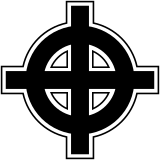Groupe Union Défense (originally named Groupe Union Droit), better known as GUD, was a French far-right students' union formed in the 1960s. After a period of inactivity it relaunched in 2022.[2][3][4]
 | |
| Successor | Social Bastion |
|---|---|
| Formation | 1968 |
| Dissolved | 26 June 2024[1] |
| Type | Far-right students' union |
| Location | |
The GUD was based in Panthéon-Assas University,[5][6][7] a law school in Paris.
On 26 June 2024, the French government ordered the dissolution of the GUD.[8]
Ideology
Formed as far-right, anti-communist youth organization, in the mid-1980s, the GUD turned toward support of the Third Position movements and "national revolutionary" theories,[9] as well as embracing anti-Zionism, anti-Americanism and support for Hafez al-Assad.[10]
Culture
GUD took as symbol the Celtic cross and the comic black rats (rats noirs).[11][12]
Some music groups of Rock identitaire français had connections with GUD.[13][14][15]
History

GUD was founded in December 1968 under the name Union Droit at Panthéon-Assas University[10] by Alain Robert (homme politique), Gérard Longuet,[16] Gérard Ecorcheville and some members of the political movement Occident. In its early period, it was a reactionary bourgeois student movement, and some of its early members went on to become mainstream conservative politicians, including Gérard Longuet, Hervé Novelli and Alain Madelin.[10][17]
Members of the GUD participated in the 1969 founding of Ordre Nouveau.[18]
During the 1970s and early 1980s, linked to the Parti des forces nouvelles (PFN),the GUD published the satiric monthly Alternative.[19] Members in this period included Alain Orsoni, a Corsican nationalist linked to organised crime and suspected of the murder of Marie-Jeanne Bozzi.[10]
On 9 May 1994 GUD member Sébastien Deyzieu died after clashes between nationalists and riot police.[20][21] Following these event, some French nationalist groups formed an umbrella organization Comité du 9-Mai (C9M) and holds[clarification needed] yearly a commemorative marches in Paris on May 9.[22][23]
In 1998, the Group united itself with Jeune Résistance and the Union des cercles résistance, offshoots of Nouvelle Résistance group, under the name Unité Radicale, but it was dissolved[24][25] after Maxime Brunerie's failed assassination attempt on president Jacques Chirac.[26]
In 2004, the GUD reformed under the name Rassemblement étudiant de droite. Its publication was Le Dissident.[27]
In 2017 members of the GUD squatted a building in Lyon and founded political movement Social Bastion.[28][29][30]
In late 2022, graffiti appeared in educational institutions in Paris (including the École Normale Supérieure) saying "GUD is back"; a video was released on Ouest Casual, a Telegram channel used by the far right, commemorating some Greek neo-Nazis; and the GUD slogan “Europe, Youth, Revolution” appeared on stickers in Paris and chants at a right-wing demonstration in Lyon. Its activists were reported to be drawn from far-right trade union La Cocarde Étudiante, the ultra-right group the Zouaves, traditionalist Catholics from Versailles, and football hooligans.[10]
Members
Successive leaders of the GUD were: Alain Robert, Jack Marchal, Jean-François Santacroce, Serge Rep, Philippe Cuignache, Charles-Henri Varaut, Frédéric Chatillon, William Bonnefoy, Benoît Fleury.
Military volunteers
Some GUD members have fought in Lebanese Civil War with the Kataeb Party[31] in 1976, Croatian War of Independence[32] in the 1990s and in Burma during Karen conflict.[33] In 1985 member of the GUD Jean-Philippe Courrèges was killed in action fighting for the Karen National Liberation Army.[34]
GUD members have had links with the Department for Protection and Security, which is the security organization of the far-right political party National Front.[35]
Former member of the GUD Alain Orsoni was member of the FLNC.[36]
See also
- History of far-right movements in France
- Federation of Nationalist Students
- Youth Front (Italy)
- Fronte universitario d'azione nazionale
References
Bibliography
External links
Wikiwand in your browser!
Seamless Wikipedia browsing. On steroids.
Every time you click a link to Wikipedia, Wiktionary or Wikiquote in your browser's search results, it will show the modern Wikiwand interface.
Wikiwand extension is a five stars, simple, with minimum permission required to keep your browsing private, safe and transparent.
